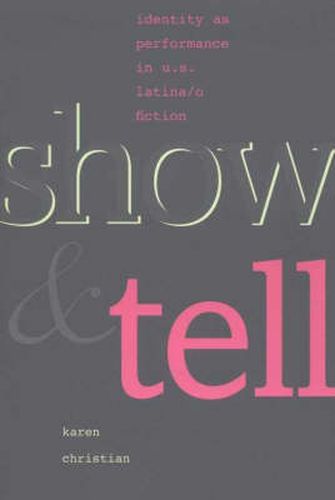Readings Newsletter
Become a Readings Member to make your shopping experience even easier.
Sign in or sign up for free!
You’re not far away from qualifying for FREE standard shipping within Australia
You’ve qualified for FREE standard shipping within Australia
The cart is loading…






What makes John Rechy a Chicano writer? To be Latino, must writing have a touch of ‘magical realism’? Can one talk of US Latina/o identity, considering the diversity of the Latina/o experience? Through the analysis of nine recent Latino/a novels, Karen Christian answers these and other questions, thereby adding a fresh, bold voice to the anti-essentialist debate surrounding ethnic and gender identity. Christian melds the theory of ‘performativity’ with the latest scholarship on ethnicity and ethnic literature to create a framework for viewing identity as a continuous process that cannot be reduced to static categories. Through their narrative ‘performances’, US Latina/o writers and their characters move among communities and identities in an ongoing challenge to the notion of Latina/o essence. This study is also among the first to examine trends across the spectrum of cultures represented in US Latina/o literature – from Chicano to Cuban to Puerto Rican to Dominican. This book is essential for any serious student of Latina/o literature and identity.
$9.00 standard shipping within Australia
FREE standard shipping within Australia for orders over $100.00
Express & International shipping calculated at checkout
What makes John Rechy a Chicano writer? To be Latino, must writing have a touch of ‘magical realism’? Can one talk of US Latina/o identity, considering the diversity of the Latina/o experience? Through the analysis of nine recent Latino/a novels, Karen Christian answers these and other questions, thereby adding a fresh, bold voice to the anti-essentialist debate surrounding ethnic and gender identity. Christian melds the theory of ‘performativity’ with the latest scholarship on ethnicity and ethnic literature to create a framework for viewing identity as a continuous process that cannot be reduced to static categories. Through their narrative ‘performances’, US Latina/o writers and their characters move among communities and identities in an ongoing challenge to the notion of Latina/o essence. This study is also among the first to examine trends across the spectrum of cultures represented in US Latina/o literature – from Chicano to Cuban to Puerto Rican to Dominican. This book is essential for any serious student of Latina/o literature and identity.